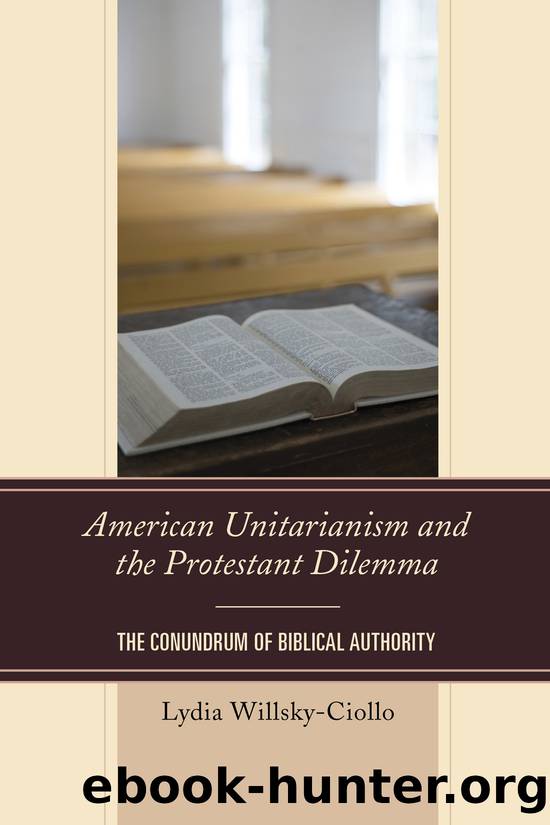American Unitarianism and the Protestant Dilemma by Willsky-Ciollo Lydia;

Author:Willsky-Ciollo, Lydia;
Language: eng
Format: epub
Publisher: Lexington Books/Fortress Academic
Chapter 5
A Practical Spirit
Frederic Henry Hedge and the Universal Church
The decades immediately following Parkerâs eventful 1841 entrance on the scene were characterized by Unitarian experiments with religious authority. Describing the full array of such experimentation would be impossible in the space remaining. Instead, this chapter and the next explore, respectively, the mainstream Unitarian approach to religious authority and the multiplicity of alternative approaches abounding. As a moderate, seeking a way to reconcile the warring factions within Unitarianism after Parker, Frederic Henry Hedge is representative of the mainstream approach (of which the AUA Executive Committee that caused Parker so much ire is also representative). Though a devoted Biblicist during his lifetime, Hedge understood that for Unitarianism to survive, the Bible could no longer stand on its own. Instead, in the years following the Parker controversy, he focused his efforts on establishing a new source of authority within Unitarianism: the Unitarian Church itself. Arguably, and besides his friend Henry Whitney Bellows, no individual was more ecclesiastically focused than Hedge in the years between 1841 and 1865.1 Establishing a definitive, liberal Christian Church, one that could (hopefully) respect the requirements of free inquiry, while retaining a sustaining set of church forms and structures, became Hedgeâs goal in those tumultuous years following Parker, when Unitarianism was compelled to confront its crisis of identity. In Hedgeâs understanding, the Church did not have to be a cold place hostile to new ideas and unyielding to reform, but a place to seek guidance and refuge against critics and that served as the authoritative channel of both the Bible and the Spirit.
In many ways, Hedge was the perfect person to confront the war brewing between the Transcendentalists and the more conservative Unitarians. First of all, Hedge had a foot in both campsâa fact that often perplexed and infuriated his friends. Emerson and Ripley claimed him for the radical cause and fellow Unitarian preachers Convers Francis and Henry Ware, Jr. identified him as conservative. Both sides believed his views to be aligned with theirs, and both would experience periods of disappointment, feeling Hedge had betrayed them by reneging on his âtrueâ or âoriginalâ views.2 In truth, Hedge defied any one means of definitionâa characteristic common to all four of the figures examined in this work. For his part, Hedge felt he had always straddled both worlds and felt no urgency to remedy this fact. Writing about his views on the precipitousness of the early Transcendentalist campaign for a ânew church,â Hedge recalled, âI had no belief in ecclesiastical revolutions to be accomplished with set purpose; and I seemed to discern a power and meaning in the old, which the more impassioned would not allow. I had even then made up my mind, that the method of revolution in theology is not discussion, but development.â Citing his âhistorical conscienceâ as the ballast for his âneologyâ or his promotion of the newer, Transcendentalist ideology, Hedge described himself as âecclesiastically conservative, though intellectually radical.â3 He was a moderateâand at that time, no
Download
This site does not store any files on its server. We only index and link to content provided by other sites. Please contact the content providers to delete copyright contents if any and email us, we'll remove relevant links or contents immediately.
The Vikings: Conquering England, France, and Ireland by Wernick Robert(79224)
Ali Pasha, Lion of Ioannina by Eugenia Russell & Eugenia Russell(39942)
The Vikings: Discoverers of a New World by Wernick Robert(36831)
The Conquerors (The Winning of America Series Book 3) by Eckert Allan W(36716)
Cecilia; Or, Memoirs of an Heiress — Volume 1 by Fanny Burney(32095)
Cecilia; Or, Memoirs of an Heiress — Volume 3 by Fanny Burney(31482)
Cecilia; Or, Memoirs of an Heiress — Volume 2 by Fanny Burney(31436)
Empire of the Sikhs by Patwant Singh(22780)
Hans Sturm: A Soldier's Odyssey on the Eastern Front by Gordon Williamson(18341)
The Secret History by Donna Tartt(18269)
Cat's cradle by Kurt Vonnegut(14806)
Sapiens: A Brief History of Humankind by Yuval Noah Harari(14006)
Pimp by Iceberg Slim(13828)
Talking to Strangers by Malcolm Gladwell(12916)
Norse Mythology by Gaiman Neil(12880)
Leonardo da Vinci by Walter Isaacson(12834)
Underground: A Human History of the Worlds Beneath Our Feet by Will Hunt(11857)
4 3 2 1: A Novel by Paul Auster(11843)
The Radium Girls by Kate Moore(11652)
